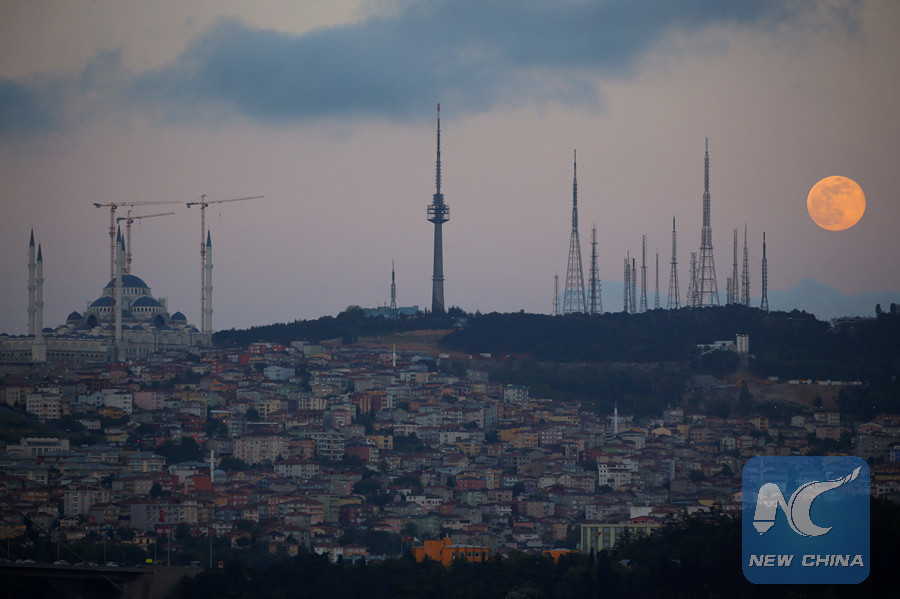
A full moon is seen rising over the Asian part of the city in Istanbul, Turkey, May 10, 2017.(Xinhua/Reuter photo)
ISTANBUL, May 12 (Xinhua) -- The Istiklal Avenue at central Istanbul has been undergoing an extensive renovation for some time, but the facelift has led some to bemoan a dying pedestrian thoroughfare well known in Turkey and abroad alike.
In the minds of some Turks, the Istiklal or Independence Avenue was one teeming with vibrant cheerful crowds, with a 19th-century-style red replica tram carrying tourists among trees lined on both sides of the rail.
On the street paved with cobble stones were world-famous bookstores selling international literature and periodicals, art galleries, shops, restaurants, coffeehouses and bars.
For them, these scenes are only memories kept in old photos now, as the street under construction looks like a war zone at the moment.
The mayor of Beyoglu district, where the Istiklal Avenue lies, recently posted renderings showing what the street would look like when the revonation is over, including one about the street paved by hard-wearing granite.
"What I see is a granite-covered river flowing in the middle of a concrete valley," Kanat Atkaya wrote in his Hurriyet daily column. "You can neither see a shade nor a tree nor a planter."
"All the trees in the area are gone," Gulse Birsel, a Turkish comedian and writer, wrote in a recent article. "It is an awful street with no fun at all" and "not a trace of charm, history, tree or livelihood."
Most intellectuals, including artists, columnists and musicians, agree that Istiklal has lost its soul, its glory and its magic gradually during the last five years.
More and more shops, bookstores, restaurants, cafes and art galleries on Istiklal are being shuttered, as Istanbul and other cities have been hit by a series of suicide bombing attacks over the last two years and the country went through a failed coup in July last year, in developments that have scared away many foreign visitors.
For many, these are not the only reasons behind the street's dying.
In the view of another columnist Onur Basturk, the problem lies in "the endless renewal appetite" of the authorities.
"The same stones have been on the streets for a thousand years as a sign of respect and care," he wrote of some world cities, arguing that it is too late now for Istiklal.
For many others, all these renovation works are deliberate acts aiming to transform the street to make it suitable for Arabian tourists' appetites, as they look like the new dwellers there now.
"The movie theaters, art galleries have already been transformed into shopping malls and the bookstores into cosmetic shops appealing to rich Arab tourists," Nupelda Celik, a student majoring in psychology, told Xinhua.
"I am very well aware that all these modernization is all for Arab taste and not for me," she said at a coffeehouse in Istiklal.
Hasan Akkaya, owner of the coffee shop, agreed that "there is a deliberate action here," as he served tea to Celik, his only customer.
"They are acting as if they want to finish off Beyoglu," he remarked. "People who were born in Beyoglu, who were doing business here, those who contributed the most to the development of culture on Istiklal Street have already left the neighborhood."
The construction of a giant mosque at the Taksim Square close to Istiklal began in February.
"There are various mosques in Istiklal. Why bother to build another?" demanded Itir Bayburoglu, who lived in upscale Cihangir neighboring Istiklal. "It is part of the Arabization of the area. This is very obvious."
The iconic Taksim Square used to be a major traffic hub. It was transformed recently into a pedestrian area of 100,000 square meters, with the entire area paved by granite.
"They think everything would have a modern look when covered with granite and concrete," said Celik. "But we need nostalgia, we need more green space, flowers and trees and not further modernization."

